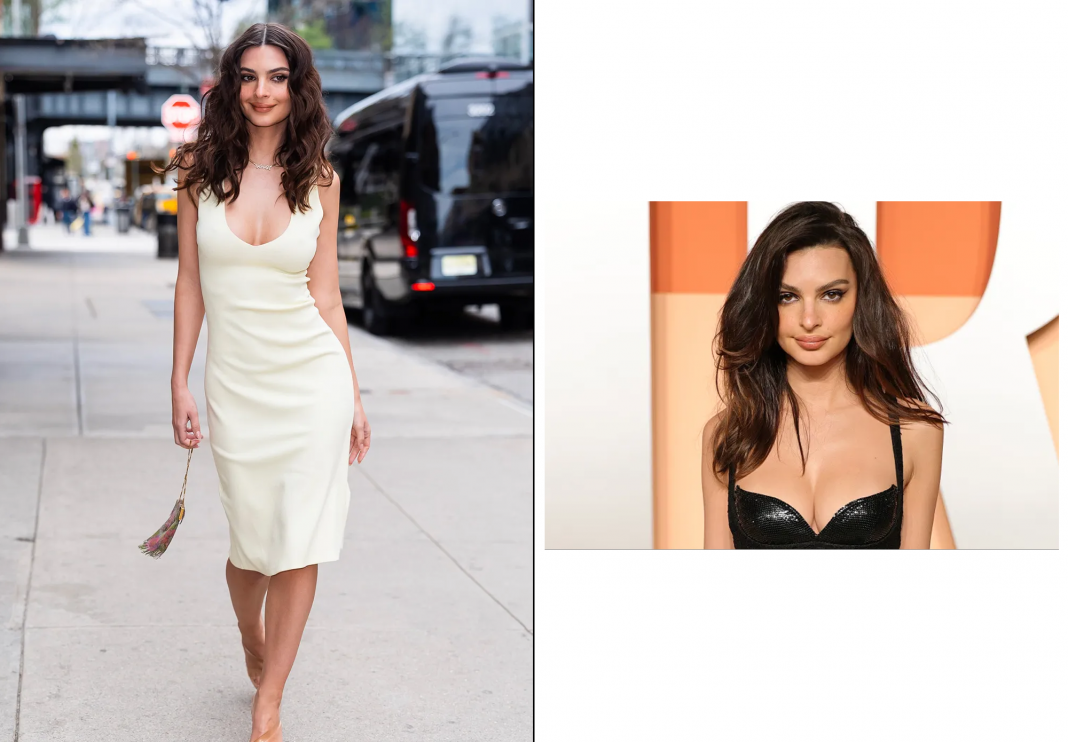Emily Ratajkowski is no stranger to challenging expectations—whether in fashion, feminism, or fame. Now, as a mother, the model, author, and entrepreneur is rewriting the narrative of what modern motherhood looks like. In a revealing new interview with ELLE, Ratajkowski reflects on her evolving relationship with style, her son, and her shifting priorities—while continuing to defy conventional ideals attached to being a mom in the public eye.
Dressing for herself—and not for the mom stereotype
In a culture where moms are often expected to dress down or disappear altogether, Emily Ratajkowski leans into fashion as a personal and subversive act. Speaking with ELLE, she shared how her daily routine—especially school pick-up—has reshaped her wardrobe, but not her style philosophy. “It’s a little bit of a walk to my son’s school now, so I can’t wear heeled shoes,” she said with a laugh. “But when I was in the city, we lived two blocks from his preschool, and I would often just leave for work from there.”
At that time, Ratajkowski was hosting a filmed podcast and often dressed in looks that turned heads—something she noticed set her apart from other parents. “Oh, I was definitely dressed up compared to them,” she admitted. Rather than shy away from the attention, she embraced it as an intentional, empowering choice. “I think that’s actually one of the ways I really enjoy being subversive with motherhood. There’s so much around what a mom should look like.”
:max_bytes(150000):strip_icc():focal(749x0:751x2):format(webp)/Emily-Ratajkowski-43-061825-b9754e74dc6848aab47468195f3dfe2a.jpg)
Her statement isn’t just about clothing—it’s about agency. Ratajkowski challenges the societal expectation that motherhood should come with sartorial invisibility. Instead, she continues to see fashion as a form of self-expression and autonomy.
A fashion statement with meaning
Ratajkowski’s fashion philosophy was visually underscored by the editorial spread accompanying her ELLE feature. Shot in natural light and warm tones, the model posed in a series of bold Prada pieces that fuse femininity with edge. From red leather shorts paired with a delicate white floral blouse to a striped micro-set in muted tan and black, every look spoke to duality: strength and softness, rebellion and restraint.
The cover image encapsulated the mood perfectly—Ratajkowski lounging in the grass, wearing a 1960s-inspired Prada dress while holding a small flower delicately near her face. The visual narrative was clear: motherhood doesn’t mean the end of personal style or sensuality—it can be the next stage of it.
For Ratajkowski, dressing “up” isn’t about attention; it’s about intention. It’s about reclaiming the space that mothers are so often expected to vacate—especially when it comes to public expression of identity, power, and beauty.
Community over convention
:max_bytes(150000):strip_icc():focal(499x0:501x2):format(webp)/Emily-Ratajkowski-44-061825-f617aada03da411b9a04cc51c5b247a5.jpg)
Ratajkowski’s transformation isn’t only external. Since becoming a mother in 2021 to son Sylvester Apollo Bear—whom she shares with ex-husband Sebastian Bear-McClard—her priorities have shifted toward deeper connections and more meaningful communities. One of the most striking admissions in the interview was her evolving relationship with men and romance.
“Not centering men is really wonderful,” she said plainly. “In general, in our world, men have somehow filed this space, but what I found instead of it is community.” For Ratajkowski, this shift isn’t about exclusion, but realignment. “I still like men. I just have zero straight men in my life, unless they’re a romantic interest,” she explained. “In the hierarchy of needs, that’s at the top of the pyramid, which is nice.”
She now finds her sense of belonging not in male validation, but in a network of women and queer people. “The rest of my life is community with other women and queer people, and being a mom,” she added. That community isn’t only a support system—it’s a mirror for growth, softness, and solidarity.
Redefining the modern mom
Emily Ratajkowski’s journey from It-girl to mother, and now to independent voice in media and culture, highlights the complex layers of womanhood today. She is redefining motherhood not as a shedding of self, but a deepening of it—one where style, ambition, sensuality, and maternal love can all coexist without apology.
In a world where mothers are often asked to minimize themselves—to mute their sexuality, limit their visibility, or dull their edges—Ratajkowski offers a counter-narrative: one of visibility, autonomy, and self-definition. She doesn’t present a polished, idealized image of motherhood. Instead, she models something more vital: permission to be whole, complicated, and fully expressed.
For many women navigating the expectations of motherhood in the public and private spheres, that kind of representation matters. It opens space not only for reinvention, but also for resistance—to the quiet erasure that so often comes with the title of “mom.” In her own words and on her own terms, Ratajkowski is reshaping what it means to be a mother in the 21st century. And she’s doing it in Prada shorts.



